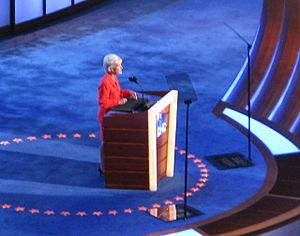Kathleen Sebelius facts for kids
Quick facts for kids
Kathleen Sebelius
|
|
|---|---|
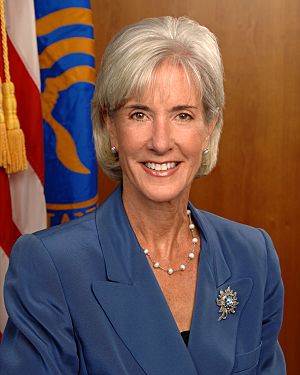
Official portrait, 2009
|
|
| 21st United States Secretary of Health and Human Services | |
| In office April 28, 2009 – June 9, 2014 |
|
| President | Barack Obama |
| Deputy | Bill Corr |
| Preceded by | Mike Leavitt |
| Succeeded by | Sylvia Mathews Burwell |
| 44th Governor of Kansas | |
| In office January 13, 2003 – April 28, 2009 |
|
| Lieutenant | John E. Moore Mark Parkinson |
| Preceded by | Bill Graves |
| Succeeded by | Mark Parkinson |
| 23rd Kansas Insurance Commissioner | |
| In office January 9, 1995 – January 13, 2003 |
|
| Governor | Bill Graves |
| Preceded by | Ronald L. Todd |
| Succeeded by | Sandy Praeger |
| Member of the Kansas House of Representatives from the 56th district |
|
| In office 1987–1995 |
|
| Preceded by | Judith C. Runnels |
| Succeeded by | Nancy Kirk |
| Personal details | |
| Born |
Kathleen Gilligan
May 15, 1948 Cincinnati, Ohio, U.S. |
| Political party | Democratic |
| Spouse |
K. Gary Sebelius
(m. 1974) |
| Children | 2 |
| Parent |
|
| Relatives | Keith Sebelius (father-in-law) |
| Education | Trinity Washington University (BA) University of Kansas (MPA) |
Kathleen Sebelius (born May 15, 1948) is an American politician who served as the 21st United States Secretary of Health and Human Services from 2009 to 2014. In this role, she helped put the Affordable Care Act into action. This law is a major plan to help more Americans get health insurance.
Before working for the U.S. government, Sebelius was the 44th governor of Kansas from 2003 to 2009. She was the second woman to be governor of Kansas. She is a member of the Democratic Party. Today, she is the CEO of a company called Sebelius Resources LLC.
Contents
Early Life and Education
Kathleen Sebelius was born in Cincinnati, Ohio. Her father, John J. Gilligan, was also a politician. He served in the U.S. Congress and was later elected governor of Ohio. Growing up, Kathleen helped with her father's campaigns.
She went to Trinity Washington University in Washington, D.C., where she studied political science. Later, she earned a Master of Public Administration degree from the University of Kansas. A Master of Public Administration is a degree for people who want to work in government or for non-profit groups. She moved to Kansas in 1974.
Political Career in Kansas
Before becoming governor, Sebelius held several important jobs in Kansas. From 1977 to 1986, she worked for the Kansas Trial Lawyers Association, representing their interests to the government.
Kansas House of Representatives
In 1986, Sebelius was elected to the Kansas House of Representatives. She represented the people of Topeka, Kansas. She was re-elected three times, serving until 1995.
Kansas Insurance Commissioner
In 1994, Sebelius ran for Kansas Insurance Commissioner and won. This was a surprise because a Democrat had not held that job in over 100 years. As commissioner, she was in charge of the state's insurance industry.
She made a big decision to block a merger between two large health insurance companies. She believed the merger would not be good for the people of Kansas. For her work, Governing Magazine named her one of its Public Officials of the Year in 2001.
Governor of Kansas (2003–2009)
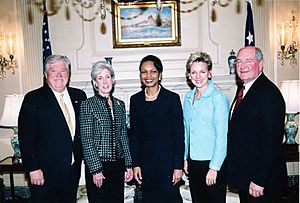
In 2002, Sebelius was elected governor of Kansas. She and her father became the first father-daughter pair to both serve as governors in the United States.
First Term as Governor
As governor, Sebelius focused on the state's budget and education. She worked to get rid of a $1.1 billion debt without raising most taxes. She also increased funding for public schools.
In 2005, Time magazine named her one of the five best governors in America. The magazine praised her for working with both Democrats and Republicans in the state legislature.
Second Term as Governor
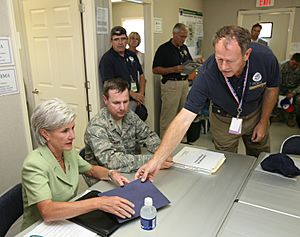
Sebelius won re-election in 2006 by a large margin. During her second term, she continued to be a prominent national figure.
In 2008, she gave the Democratic Party's official response to President George W. Bush's State of the Union Address. This is a special speech given by a member of the opposing party. Soon after, she supported Barack Obama in his campaign for president.
Because of her success as a governor in a mostly Republican state, many people thought she might be chosen as the vice presidential candidate for the Democratic Party in 2008. However, Barack Obama chose Joe Biden as his running mate.
U.S. Secretary of Health and Human Services
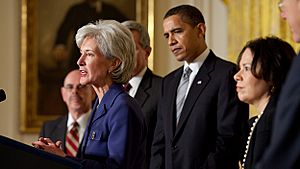
After Barack Obama was elected president, he chose Sebelius to be his Secretary of Health and Human Services. This person leads a major government department that deals with health, medicine, and social services for all Americans.
The United States Senate confirmed her for the job on April 28, 2009. She was sworn in during an outbreak of swine flu, so she had to get to work right away to help manage the public health crisis.
The Affordable Care Act
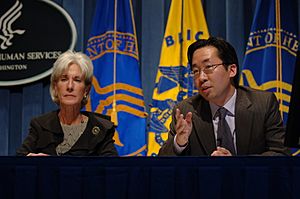
One of Sebelius's biggest jobs was to help launch the Affordable Care Act (ACA). The ACA is a law designed to make health insurance available to more people.
When the main website for the ACA, HealthCare.gov, had many technical problems at its launch, Sebelius took responsibility. She apologized to the public and promised to fix the issues. She said, "You deserve better. I apologize. I'm accountable to you for fixing these problems."
Despite the difficult launch, the ACA went on to help millions of Americans get health insurance.
Resignation
Sebelius resigned as Secretary of Health and Human Services on April 11, 2014. President Obama thanked her for her service, especially for her work on the Affordable Care Act. She was succeeded by Sylvia Mathews Burwell.
Key Political Stances
As a politician, Kathleen Sebelius has taken clear positions on many important issues.
Health and Women's Rights
Sebelius is a strong supporter of a woman's right to make her own healthcare decisions. While she was governor of Kansas, she vetoed (or rejected) several bills that would have placed more limits on these rights. This position sometimes caused disagreement with leaders in the Catholic Church, of which she is a member.
Capital Punishment
Sebelius is an opponent of capital punishment, also known as the death penalty. During her time as governor, there were legal challenges to the death penalty law in Kansas.
Environment
Sebelius has been a strong supporter of protecting the environment. She pushed for more recycling and supported the development of renewable energy like wind energy. As governor, she vetoed bills that would have allowed new coal-fired power plants to be built, citing concerns about climate change.
Firearms
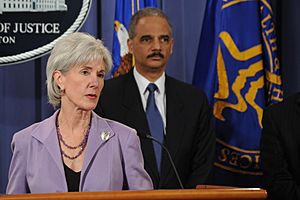
Sebelius has said she supports the right to own firearms. However, she has also expressed concerns about laws that would allow people to carry concealed (or hidden) guns in public places. She vetoed a concealed-carry bill in Kansas, but the legislature later overrode her veto, making it law.
Life After Politics
After leaving her government position, Sebelius founded Sebelius Resources LLC. Her company gives advice to businesses, universities, and other organizations.
She also serves on the boards of several companies and foundations, including the Kaiser Family Foundation, which focuses on health issues. She often gives speeches at events around the world.
Personal Life
In 1974, Kathleen married K. Gary Sebelius. His father, Keith Sebelius, was a Republican Congressman from Kansas. They have two sons, Ned and John. Her husband was a U.S. Magistrate Judge in Kansas until he retired in 2019.
Electoral history
| Kansas gubernatorial election 2002 | |||||
|---|---|---|---|---|---|
| Party | Candidate | Votes | % | ±% | |
| Democratic | Kathleen Sebelius | 435,462 | 52.9 | ||
| Republican | Tim Shallenburger | 371,325 | 45.3 | ||
| Kansas gubernatorial election 2006 | |||||
|---|---|---|---|---|---|
| Party | Candidate | Votes | % | ±% | |
| Democratic | Kathleen Sebelius (incumbent) | 480,532 | 57.8 | +4.9 | |
| Republican | Jim Barnett | 336,583 | 40.5 | ||
See also
 In Spanish: Kathleen Sebelius para niños
In Spanish: Kathleen Sebelius para niños
- List of female United States Cabinet members
- List of female governors in the United States
 | Shirley Ann Jackson |
 | Garett Morgan |
 | J. Ernest Wilkins Jr. |
 | Elijah McCoy |


